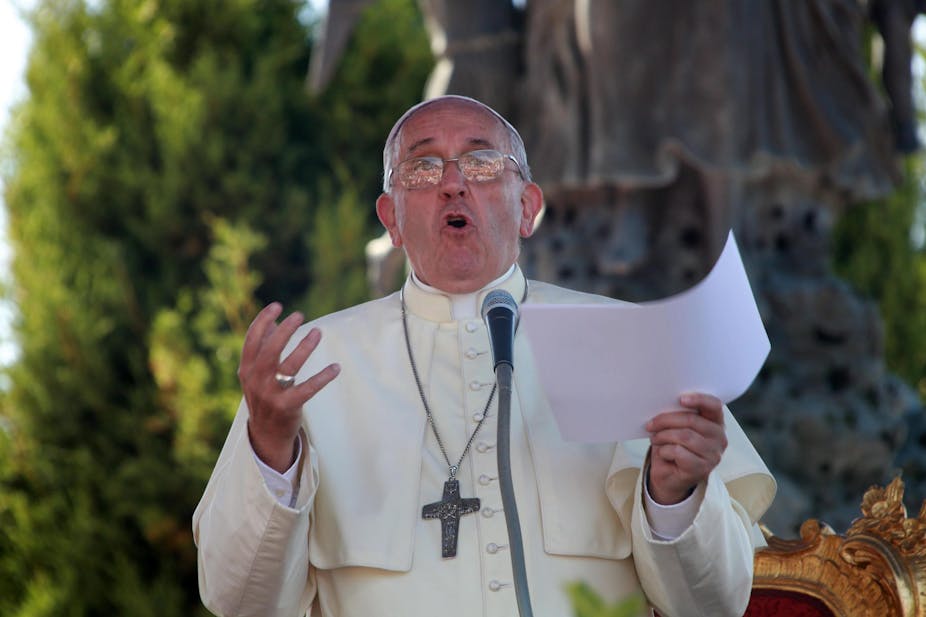A blog in The Economist recently accused Pope Francis of following the founder of the Soviet Union, Vladimir Lenin, in adopting an “ultra-radical line” on capitalism. The blog, “Francis, capitalism and war: the Pope’s divisions”, was reacting to the Pope’s interview on June 9 in Spanish newspaper La Vanguardia, in which he linked an earlier form of capitalism with imperialism as the main causes of World War One.
In response, in an interview with the Italian daily Il Messaggero, the Pope said:
The communists have stolen the flag. The flag of the poor is Christian … The poor are at the centre of the Gospel.
Francis pointed to the Beatitudes, and Matthew’s Last Judgment scene when God will judge us on how we treated the hungry, naked, the prisoners.
“The communists say that all this is communist,” Francis said, yet Christians said this 20 centuries earlier. Pope Francis said one could reply to the communists: “you are Christians” in your concern for the poor.
Reasserting Catholic social thinking
Pope Francis’s views are arousing controversy, since many people seem unaware how strongly Catholic social thinking is opposed to the neoliberal policies of the free-marketeers. In the La Vanguardia interview, Francis was distressed that in some countries unemployment levels exceed 50% of workers. He had been told that 75 million young Europeans under 25 years of age were unemployed.
“That is an atrocity, discarding an entire generation to maintain an economic system” that was collapsing, and that depends on the armaments industry to survive. Francis supported the possibilities of globalisation, but deplored the discarding of the young and the elderly.
It was “incomprehensible” that so many people in the world are still hungry. Francis said “the world economic system is not good”, and “we have put money at the centre, the god of money”.
Others disputed the Pope’s critique of inequality. In the UK Telegraph, Allister Heath contested the views of Francis for his attack on economic inequalities and the “new tyranny” of the “absolute autonomy of markets”:
Francis’ wholesale condemnation of inequality is thus tantamount to a complete rejection of contemporary economic systems. It is not a call for reform … but a radical denunciation.
Heath rejected Francis’s criticism of “trickle-down economics” as a caricature of free-market arguments. Instead, Heath regarded capitalism as “the greatest alleviator of poverty and liberator of people ever discovered”.
Paul B. Farrell’s suggestion in the Wall Street Journal is for Francis to support Bill Gates’ “Giving Pledge” for the super rich to give away half their fortunes in their lifetimes. So far 122 of the super rich have agreed to do so. Alas, this would do nothing to challenge the causes of the perverse distribution of wealth in most capitalist economies.
As Archbishop of Buenos Aires before he became Pope, Bergoglio experienced the trauma of Argentina going into the biggest financial default in history in 2002, owing nearly US$100 billion, much of it lost by mismanagement and war under earlier military regimes.
The percentage of Argentina’s population plunged into poverty rose to 50%, compared with 7% in the 1970s. Millions lost their savings, a quarter of workers lost their jobs and a quarter of the population was left destitute and hungry.
While most of the debt was restructured, so-called “vulture funds” bought up some of the debt for a pittance and demanded that Argentina pay US$1.33 billion, making a return of 1000% to these 1.6% of original bondholders. Despite a German court striking out similar “vulture fund” claims in 2013, astonishingly the US Supreme Court in June 2014 ordered the full debt be paid.
Francis is speaking against the background of such predatory forms of capitalism.
Francis condemns gross inequality
On April 28, the Pope tweeted:
Francis was quoting from his exhortation, The Joy of the Gospel, #202.
The message quickly drew thousands of retweets, some critical. Joe Carter, the director of the Acton Institute, an American free market think-tank that is underpinned by religious thought, tweeted:
Thomas Piketty’s massive tome Capital in the Twenty-first Century had recently been published in English, arguing that the capitalist economy was inherently geared to greatly increasing inequality. Francis considers extreme “unbridled consumerism combined with inequality” outrageous. He fears that resentment by impoverished populations will fuel revolutions, as it has in the past.
Francis is not arguing for absolute equality, as some of his critics have claimed. The Catholic Church has never called for absolute equality. It has argued for a just distribution of goods and services that ensures everyone the possibility of a reasonable life and standard of living. Perhaps “social equity” is a better translation for what the Pope has in mind, but this implies more than the notion of equality of opportunity, since outcomes matter as well.
While sharply critical of the neoliberal views that exacerbated the global financial crisis, Francis strongly supports economic policies that promote material and social uplift more equitably. Speaking in Rome last month, Francis said:
It is increasingly intolerable that financial markets are shaping the destiny of peoples rather than serving their needs, or that the few derive immense wealth from financial speculation while the many are deeply burdened by the consequences.
These issues are likely to figure prominently in the forthcoming document on the environment that Francis’s team of advisers have been preparing.

